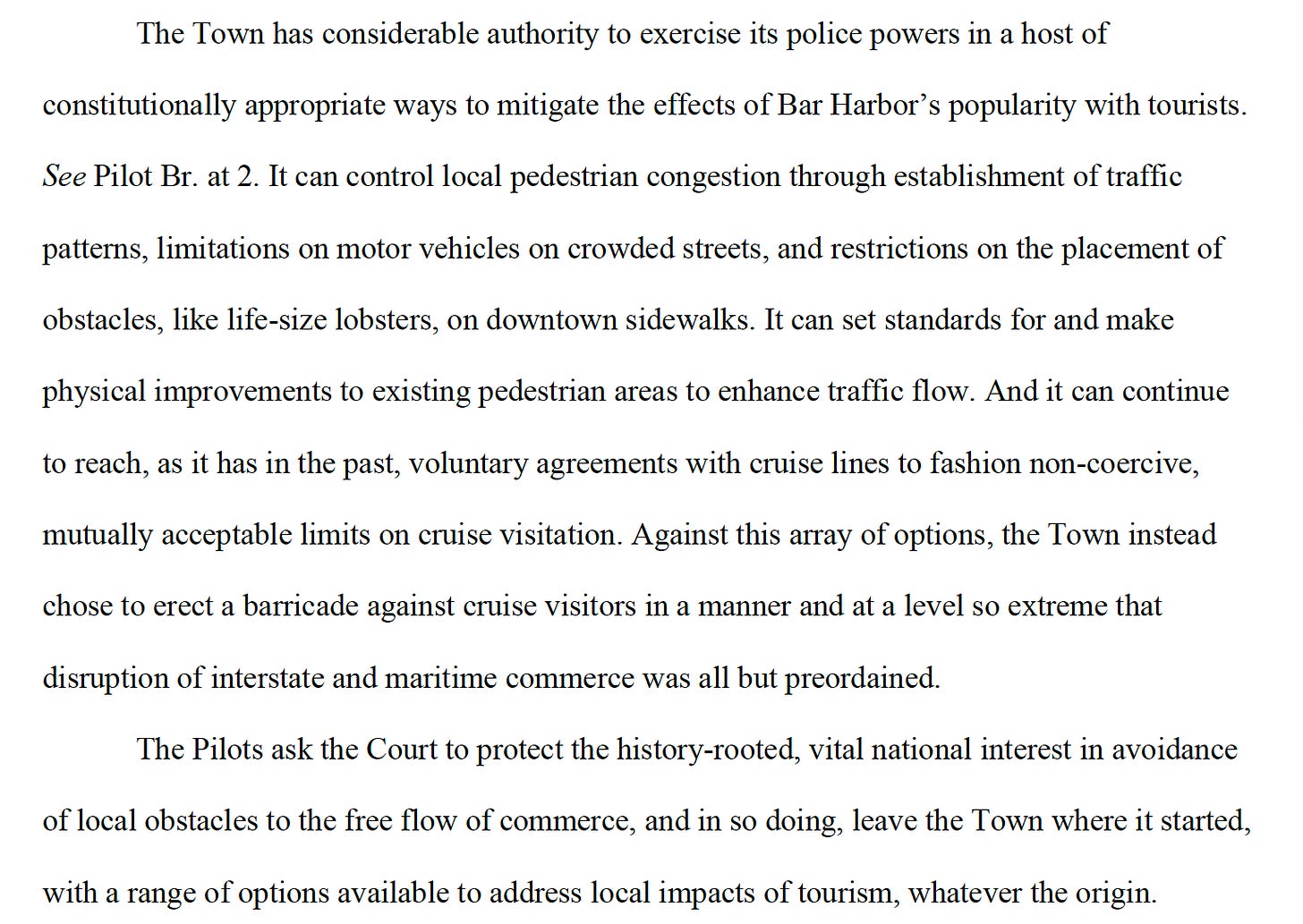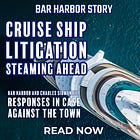APPLL and Pilots File Final Rebuttal in Cruise Ship Disembarkation Lawsuit Against Town
BAR HARBOR—Both the Association to Preserve and Protect Local Livelihoods (APPLL) and the Penobscot Bay and River Pilots Associations filed briefs October 27. Those should be their final rebuttal briefs in a case against the Town of Bar Harbor’s new cruise ship disembarkation limits that were placed into the town’s land use ordinance. Those limits have not yet been enacted because of the litigation.
The changes were brought up by a citizen initiative led by Charles Sidman and approved by voters in November 2022. They limit cruise ship disembarkations to 1,000 persons per day with financial penalties for each disembarking person over that limit. The suit was filed in December 2022.
The case went to trial in July. Since then, the plaintiff, plaintiff intervenor, defendant (Town of Bar Harbor), and defendant intervenor (Charles Sidman) have filed post-trial briefs by scheduled dates for each side. Those dates were September 1 (plaintiffs’ initial post-trial briefs) and October 6 (defendants’ briefs).
The documents filed yesterday are the final briefs before U.S. District Judge Lance Walker is expected to post a ruling. A judgement is hoped for later this year.
PLAINTIFFS BRIEF
In the October 27 filings, Timothy Woodcock of Eaton Peabody representing APPLL et. al argues that the town’s ordinance is:
Focused on disembarking persons and therefore requires a reservation system and mechanism for counting those persons;
Inflexible, meaning that it does not allow any disembarking person “on ‘any property located within the Town of Bar Harbor’—not just certain property—that triggers the punitive regime;” and also that it doesn’t matter what day or season it is, there is always a 1,000-persons cap; that it is within one calendar and even if people step off the cruise ship and immediately hop onto a bus to go into Acadia National Park, they are still counting toward that 1,000-persons limit;
Indirect, meaning that “provided no mechanism for sanctioning any of the disembarking persons or the cruise ships who brought them,” but instead targets pier owners of town-permitted facilities at a minimum of $100 for “each ‘excess unauthorized person;’” they argue that this makes the pier owners the enforcers of the ordinance.
The brief then states on page 10 (of 40),
The arguments are that federal law protecting seafarers conflicts with the ordinance, that because the word “persons” is already defined in the town’s land use ordinance (where this change will occur), it is not ambiguous and does not exclude vessel personnel, crew, pilots or representatives, among others. It also argues that by trying to tweak the definition of “person” to something else, the town was trying to keep the ordinance from “litigation peril.”
There is also discussion about the town not being a pier owner.
The brief also argues that the ordinance “conflicts with federal law governing the admission of aliens.”
It goes on to say that the ordinance violates the federal Dormant Commerce Clause by discriminating against interstate commerce, and by effectively barring large cruise ships (which the town and defendant intervenor Charles Sidman deny the ordinance does). It also writes that the ordinance “burdens arteries of commerce,” and violates due process standards.
PLAINTIFF INTERVENOR’S BRIEF
For the Pilot’s Association, attorney Twain Braden writes that “the ordinance erects substantial obstacles to interstate and international maritime commerce and the movement of persons within that commerce. It is constitutionally incompatible with the federal government’s authority over immigration, customs, vessel conduct and operations, anchorage grounds, and foreign relations.”
His final brief also says that the change in the ordinance “arbitrarily discriminates against cruise vessels as instrumentalities of interstate transportation and as competitors in the Bar Harbor vacation market,” which then “undermines Maine’s interests in a sustainable pilotage system and in statewide efforts to support and grow the tourism industry. Its purported local benefits do not justify its burdens on commerce.”
The argument also focuses on the language of persons and writes that the town’s changes would “effectively barricade itself against interstate commerce.”
The arguments focus on probable effects of the ordinance, that it cannot be compared to local laws impacting maritime legal remedies and that it’s not constitutionally permissible to have local laws that regulate inherently local transportation like ferries.
He also writes that the by interpreting the ordinance after its adoption does not keep the ordinance from being constitutionally invalid.
He argues that creating town conditions about entry into Bar Harbor conflicts with federal authority. He writes that the changes are “unlawful assertions of municipal authority over federal subject matters.” The brief asserts the changes violate the Commerce Clause in the Constitution and obstructs the flow of interstate commerce, unduly burdens interstate commerce and does not leave “all comers with equal access” to the town.
The brief goes on to say that the ordinance changes would violate the Maine Constitution and is an “invalid exercise of home rule authority” by frustrating “the purpose of Maine’s pilotage and tourism statutes.”
The association’s brief concludes
In the town’s and Sidman’s October 6 post-trial briefs, they argued that Bar Harbor had home rule authority and that the citizens of Bar Harbor wanted this change. They also stated that there are no laws (state, maritime or federal) violated by the ordinance changes.
WHAT THE TOWN IS CURRENTLY DOING
Town Council Chair Valerie Peacock explained during a September meeting that while the federal case against the town’s cruise ship limits is in court, the town is running two parallel threads as it tries to determine how to deal with upcoming seasons in two different scenarios.
In the first scenario, the changes to the land use ordinance are upheld and the town wins the lawsuit. That would mean that the disembarkation rules limiting cruise ship disembarkations to 1000 or less a day (without fines) are upheld or partially upheld. Those plans have been discussed in executive sessions because of the litigation, but the town expects a draft to be made public in October. Town Attorney Stephen Wagner said it will be a stand-alone ordinance and include updates to the Harbor portion of the land use ordinance as well as updates to standard operating procedures.
In the second scenario, the town loses the case and the changes are not upheld. If that occurs, the town would continue with the new memorandums of agreement (MOAs) that the town began in 2022. Those MOAs also limited cruise ship visitation, but were not based on passenger disembarkations.
The memorandums of agreement are the town’s agreements with cruise lines about when they can visit and other details. These documents are currently being used as the town waits for the federal court decision.
The current MOAs expire at the end of December and have to be renegotiated, Peacock has said.











